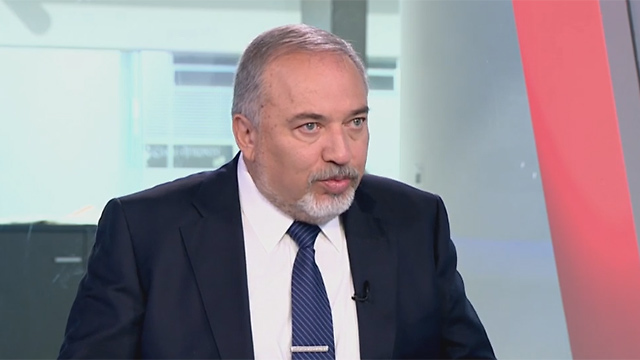
Government approves 'supermarkets bill'
Defense Minister Lieberman comes out against bill requires interior minister's approval for any new bylaws allowing Shabbat commerce, saying: 'Herzl and Jabotinsky didn't observe Shabbat.'
The government approved Sunday the so-called "supermarkets bill," which endows the Interior Ministry with the powers to overrule municipal bylaws and order the shuttering of supermarkets during the Jewish day of rest, as part of an effort to placate the coalition's Haredi parties, after the resignation of Health Minister Yaakov Litzman (United Torah Judaism) over work done on Shabbat.
The bill, sponsored by Interior Minister Aryeh Deri (Shas) was approved by a vote of 10 in favor and 2 opposed. The dissenters were Yisrael Beytenu's Minister of Defense Avigdor Lieberman and Minister of Immigrant Absorption Sofa Landver.
"Herzl and Jabotinsky didn't observe Shabbat," Lieberman argued.
Education Minister Naftali Bennett responded, telling Lieberman that: "Without 3,000 years of (observing) Shabbat, we wouldn't have had Herzl."
Deri also jumped in, noting that "Herzl's descendents all converted to Christianity."
Lieberman's fellow party member Landver also offered her objections, saying, "We will not allow a small minority to control our lives."
The bill also states any new bylaw pertaining to opening shops or recreation centers on Shabbat will have to be approved by the interior minister himself. It will not apply, however, to existing bylaws approved by the High Court, such as the ones allowing supermarkets to remain open in Tel Aviv.
"We want to maintain the status quote all over the country, and prevent the Shabbat day from becoming the national day of commerce," Deri explained. "We just want what was to remain."
During the government discussion, Deri tried to minimize the importance of the legislation, saying it will "affects things perhaps in five years."
Bennett, meanwhile, argued that "We must avoid religious coercion, while at the same time maintain the social nature of the Shabbat as well."
Prime Minister Benjamin Netanyahu offered that "the country is like a mosaic, the bill allows for flexibility in each and every city."
An hour after being approved by the government, the bill was approved at the Ministerial Committee for Legislation with a majority of three in favor and one against.
Lieberman announced last week that his party would vote against the bill proposal in the Knesset. While he is not a member of Knesset himself, Yisrael Beytenu's MKs have all been instructed to vote against the legislation, while Minister Landver will miss the vote.
Despite the fact the party's two ministers will not vote, Yisrael Beytenu's objection to the bill goes against coalition discipline, which could have ramifications in the future.
In an effort to avoid this predicament, Yisrael Beytenu MK Robert Ilatov turned to coalition chairman David Bitan on behalf of his party on Wednesday, asking not to promote the bill.
Yisrael Beytenu is not alone in opposing the bill. Last week, 58 mayors from across the country sent a letter to the prime minister, the interior minister and the justice minister, expressing their objection to the legislation.
They said the bill seeks to change the existing relationship between the national government and local authorities, and that it would constitute a change in the status quo.
Shabbat work and Breaking the Silence bills
Another bill set to be approved on Sunday is an amendment to the Hours of Work and Rest Law, stating the minister of labor and welfare will be obligated to take into account the "welfare of the employee, Israel's traditions, the existence of an alternative not necessitating employment on weekly days of rest and the degree of damage to the public arena."While convened, the government will also discuss Likud MK Yoav Kisch's "Breaking the Silence bill," allowing IDF soldiers to file class action suits if they were damaged by slander following any operational activity they took part in.
In his bill's explanatory remarks, Kisch explained that the article in Israel's anti-slander law dealing with slander on "publics" said no private civil or criminal suits will be brought forward unless the attorney general approved them or submitted them himself.
Kisch was of the opinion that Israel's detractors, who have been waging a delegitimization campaign against it on the international stage, have honed in on IDF soldiers in the past few years after recognizing them as easy targets for slander, safe in the knowledge no criminal proceedings will be brought against them.
The Likud MK also touched on the recent affair involving Breaking the Silence spokesman Dean Issacharoff, saying the State Attorney's Office determined his testimonial on beating a Palestinian was "false and the incident described never took place. Pursuant to that assertion, no charges will be filed against him, but why should Issacharoff not be sued in a civil suit over the blatant lies and damage he has caused IDF soldiers the world over?"













